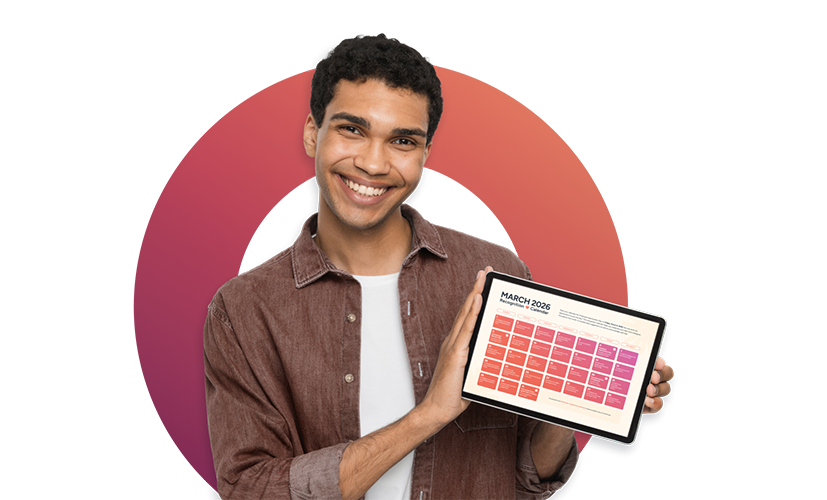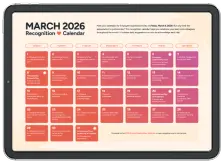Elevating Recognition with Meaningful Rewards
Rewards
May 26, 2023
Taryn Hart
X min
Rewards
May 26, 2023
Taryn Hart
X min

In today’s dynamic business landscape, companies are continuously seeking ways to attract, engage, and retain top talent. While meaningful recognition remains an essential factor, organizations are recognizing the significant role that employee rewards play when paired with recognition.
"When you recognize and reward people, you ignite their inner spark, and they become unstoppable." - Tony Robbins
Employee recognition needs are continuously evolving. For recognition to be impactful for today’s workforce, it must be personalized, and the same logic applies to employee rewards.
Together, recognition and rewards can have a transformative impact on culture. Employee rewards can create an environment that fosters motivation, loyalty, productivity, and ultimately, business success.
Employee reward programs are initiatives that recognize and reward employees for their hard work and dedication. These can range from financial incentives such as bonuses and stock options to non-financial rewards such as time off work, complimentary lunches, and summer work hours.
Organizations need to offer curated and customizable reward options to meet the demands of what all their employees truly value. The days of only offering a small catalog of products and company swag as employee incentives are not enough – organizations need to shift their focus to robust reward options that are meaningful to everyone.
Employee rewards can be a motivational tool; they can inspire individuals to grow, learn, and improve. Rewards can be tied to goals and milestones, encouraging employees to stretch their capabilities and reach new heights.
Employee rewards act as powerful motivators, igniting a sense of purpose and commitment within individuals. Whether it's a performance-based bonus, a public accolade, or a personalized gift, the act of rewarding employees for their achievements reinforces a culture of excellence and motivates others to strive for greatness.
Employee engagement is the key to unlocking untapped potential and driving exceptional results. Rewards and recognition initiatives provide a clear link between an employee's efforts and the organization's success. As engagement increases, so does productivity, creativity, and overall job satisfaction.
Employee rewards and recognition programs play a pivotal role in creating a workplace culture that attracts and retains exceptional employees. Recognizing and appreciating their hard work and achievements not only boosts morale but also enhances loyalty – employees are more likely to stay at an organization that fosters a culture of recognition.
"Recognition is not a luxury; it's a necessity. It's what keeps us motivated, inspired, and striving for greatness." - Brendon Burchard
A SHRM article that discusses how to measure organizational health mentions the ROI of employee rewards and if implemented well, how investing in rewards can drastically reduce turnover.
Companies that prioritize employee wellbeing and engagement are more likely to succeed and thrive. Implementing employee reward programs is a simple yet effective way to build a positive workplace culture that benefits both employees and the company as a whole.
The key to an effective employee rewards program is providing flexible reward options that satisfy everyone’s preferences. Personalized rewards that align with employees' needs and values are more meaningful and contribute to overall happiness and loyalty.
Ignoring employee reward programs is a missed opportunity. Employee reward and recognition programs are powerful tools that can transform a company's culture. By investing in these initiatives, organizations demonstrate their commitment to their employees' wellbeing and success, paving the way for a highly productive and fulfilled workforce.
Meaningful rewards look different for everyone. Everyone’s needs are unique and there should be reward options that will be beneficial and meaningful to all employees. Kudos Rewards offers a world-class suite of options with merchandise, events, travel, charities, gift cards and custom rewards.
Maybe it’s tickets to a favorite sports event, an outdoor adventure, or some much needed family time spent at the zoo; rewards that offer experiences and travel can serve a wide range of different interests and create lasting memories for everyone. Here are some examples of experience-based rewards offered in Kudos:
Whether it’s a retreat, a stay-cation, or even a home gym – everyone needs time to relax, decompress and treasure moments of tranquility. Here are examples of wellbeing related rewards in Kudos:
Perhaps you’ve been eyeing something special for yourself, or you need a gift idea for someone else, the Kudos Rewards catalog is a great place to start:
While recognition has long been the bedrock of appreciation, organizations are awakening to the realization that employee rewards hold tremendous sway when combined with recognition.
Recognition paired with rewards is instrumental in attracting and retaining top talent, enhancing employee engagement and motivation, fostering a positive company culture, and promoting employee wellbeing.
By acknowledging employees' efforts and successes, organizations create a culture that embraces innovation and professional development. The result is a workforce that is constantly evolving, staying ahead of the curve, and driving the company towards sustainable growth.

A newsletter with the best resources for HR professionals.


Challenge yourself to celebrate your team all month long with these helpful prompts.
Get Your Guide